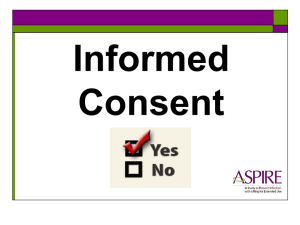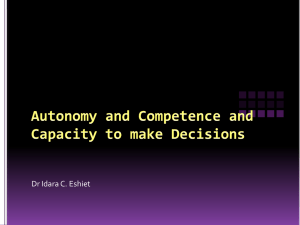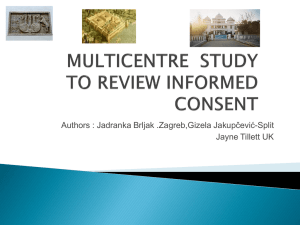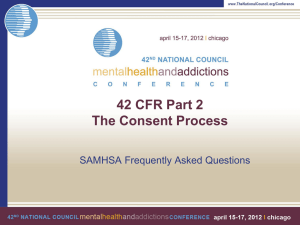An Introduction to Psychiatry Consultation Liaison Service
advertisement
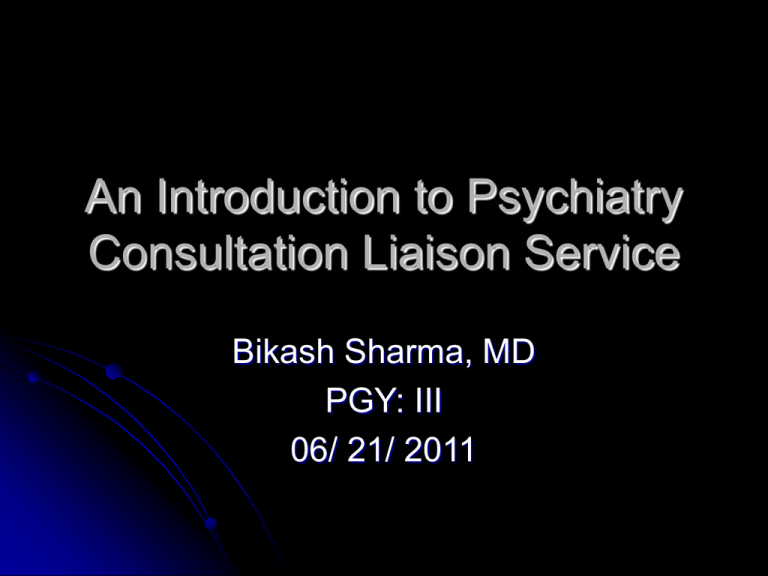
An Introduction to Psychiatry Consultation Liaison Service Bikash Sharma, MD PGY: III 06/ 21/ 2011 Learning Objectives Role of Consultation Liaison (CL) in Inpatient Hospital setting/ (Emergency Room) - Consultation Psychiatrist as effective physician - The art of Psychiatric consultation Diversities of cases encountered in CL service Informed Consent Capacity and Competency Capacity evaluation Consultation Psychiatrist as effective physician The essence of effective consultation in any medical specialty lies in the expert knowledge and skill that the invited consultant brings to the bedside. If the process is to work, both the consultee and the consultant must believe this. The alternative is at best a waste of time and, at worst, a fraud perpetrated on the patient in which the best of intentions accomplish nothing Kontos N et al 2003 Art of psychiatric consultation Clinical Approach Environmental influences Style of interaction Use of language Clinical Approach Do: Think Physiologically Existentially Avoid Distortion of truth An Ulterior motives Illicit activity Immoral activity George B Murray, S.J, M.D Do Not Do: Do not take low Do not tie your self esteem to the team’s adoption of your recommendations Do not feel the need to make a diagnosis on day one Do not say everything you have to say one day one Do not practice checklist psychiatry Do not predict the future Consultative Process Speak with the referring physician Review current and past records Review medications Gather collateral data Examine the patient Formulate diagnosis and recommendations Write a note Speak with the referring physician Role Play Specific reason for consult Triage Mental status Informed consent including patient’s willingness/ awareness to talk to psychiatrist Detailed Past/ Present medical/ psychiatric information Collateral information Recommendation to the primary team directly Follow up Differential Diagnosis Medical Psychiatric presentation of medical conditions Psychological reactions to medical conditions Psychiatric complications of medical conditions Psychiatric Medical presentation of psychiatric conditions Co morbid medical and psychiatric conditions Medical complications of psychiatric conditions Informed consent 1. Salgo Vs. Leland Stanford Junior University Board of Trustee (1957)Informed Consent 2. Natanson Vs. Kline ( 1960)- Professional Standard 3. Canterbury Vs. Spence- WDC (1970) & Cobbs Vs. Grant- CA ( 1970)- Patient Orientated Approach 3 Elements in treatment decision making, ie:Informed Consent “Disclosure of Information within a context that allows voluntary choice made by a patient who is competent to decide” Adequate information > Mental Capacity> Informed Consent Valid Informed Consent Permission voluntary given by a competent person without any elements of force, deceit, coercion after explanation and disclosure of 1. Purpose and details of procedure or treatment 2. Risks, Benefits and available alternative treatment/s 3. The right to withdrawal consent verbally or in written forms at anytime Exceptions Life threatening situation Patient who waive their rights to disclose and consent (do not want to be informed) Instances where “ disclosure’ may be harmful to the patient “ Therapeutic privileges” Capacity vs. Competency Clinical vs. Legal term that denotes the ability to make rational and reasonably well informed decisions by a particular patient (vs. person) in their treatment and/ or life decision/s Capacity is a clinical determination that addresses the integrity of mental functions. Competency is a legal determination that addresses societal interest in restricting a person’s right to make decisions or do acts because of incapacity. Case Scenario Primary clinician simultaneously assess comprehension of a patient to what has been discussed about an illness, workups, procedures If there is a concern that patient does not seem to understand contents of discussion to a reasonable degree Capacity to informed consent? CL consult for capacity to make “ particular” decision If Primary team and CL both agree that a patient lacks minimal capacity to consent, then patient is considered “incapacitated” to make decision in that “ particular’ area Alternate decision maker sought out (If not emergency: Health care Proxy Vs. Health care Surrogate/ Living will and advanced directives. If emergency: Emergency Temporary Guardian (ETG) until the court determine that pt being incompetent; then a “ legal guardian” is designated who takes decision for the patient in the area specified by the court.) Questions If a patient agrees with a procedure or treatment recommended by clinician, then the question of capacity is null, and patient is considered capacitated? If a patient disagrees with a procedure or treatment recommended by clinician, then the question of capacity arises, and patient is considered incapacitated? If a patient is incapacitated for treatment of HIV (medical decision) , then patient is incapacitated for consenting to other treatments ( other major life decision/s)? What is threshold for Capacity? STEPS IN DETERMINING A CAPACITY TO GIVE INFORMED CONSENT TO HIS/ HER TREATMENT PLAN I. Mental Capacity Assessment II. Self disclosure Being mentally ill doesn’t in itself imply a loss of capacity or competency. Having Capacity or being Competent until proven otherwise. I. Capacity Assessment To have capacity to consent to “treatment”, 4 criteria must be satisfied in a patient: 1. 2. 3. 4. To understand relevant information about the PROPOSED treatment/ treatment OPTIONS/ NO treatment Able to communicate a choice consistently To appreciate own clinical situation (insight) with regard to the proposed treatment (if a patient is in denial of illness, s/he will not be considered competent) To rationally manipulate (reasonable; sensible; sound judgment) provided information/s Process of Periodical Reassessment and Documentation Steps in Mental Capacity Assessment A. General perspective or specific (Psychiatric hospitalization, ECT) Find out the best language of communication Determine if patient has adequate information on which to base a decision MMSE: attention, concentration, memory Inform the patient about the nature of the disorder, AND the risk and benefit of the PROPOSED treatment, and of ALTERNATIVE treatments or of NO treatment B. Repeat information number of times and in different ways. Let the patient paraphrase or restate the understanding. Evaluate nature of questions that patient asks regarding treatment plan Periodical Reassessment of capacity ( if any change in clinical conditions or, mental status such as in delirium or any modifications in treatment plan) C. If patient has “severe deficit” in understanding information- No Capacity to make informed consent or make decision Arrange a process for “ a substitute decision maker” II. Self disclosure A. Consider the fact that patients will not disclose their thoughts and emotions Stigma towards mental illness Fear of legal consequences Fear of hospitalization or prolongation of hospitalization or limitation of privileges Psychiatrist as Omniscient: - can reliably predict the most unpredictable human behavior - can read mind - “Lie detector” Common misconceptions towards skills of mental health professionals: an uncertain treatment outcome II. Self disclosure B. Acknowledge the uncertainty of treatment Explain DIRECTLY to the patient that the clinician MUST rely on patient’s self discloser in order to be of most help. Explain and ask explicitly to the patient the risk in withholding and benefit in providing information For those who do not understand the importance of reporting potentially dangerous thoughts or emotions or unable to report for whatever reason (including denial of illness) will require more conservative management. For those who sufficiently understand the significance of reporting their dangerous thoughts or emotions, DOCUMENT it.( if patient later elect not to report and consequently engage in self- injury, this DOCUMENTATION will reveal that the patient understood the risk of withholding information and that the decision not to seek help was a deliberate (VOLUNTARY) and RATIONAL choice (Gutheil TG et al. Bulletin of American Academy of Psychiatry and the Law, 1986). The fundamental issue is whether the person can be held accountable for the consequences of his or her decisions and actions. Physician liability for suicidal patient The psychiatrist’s goal is to identify those individual who can “follow an agreed upon treatment plan as well as need for reporting any potentially dangerous thoughts or feelings BUT then later may choose not to as a result of being too sick, depressed, hopeless, psychotic.” “Stronger the therapist’s documented grounds for finding the patient competent and thus able to act TRULY voluntarily, the more remote the prospect of malpractice liability is likely to be” (Law at Massachusetts Mental Health) Suicide Assessment: To predict the most unpredictable and the most rear event of another individual. Suicide Assessment Dr. Barnes Psychiatric emergencies Dr. Bland Management of Acute Agitation Dr. Khurshid Involuntary Commitment Dr. Malik


